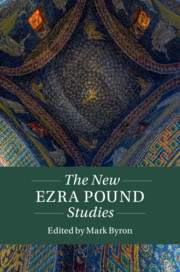Book contents
- The New Ezra Pound Studies
- Twenty-First-Century Critical Revisions
- The New Ezra Pound Studies
- Copyright page
- Contents
- Notes on Contributors
- Key to Abbreviations
- Editor’s Introduction
- Part I Pound’s Texts
- Part II Ezra Pound and Asia
- Part III Culture and Politics
- Chapter 11 The Transnational Turn
- Chapter 12 Pound, Gender, Sexuality
- Chapter 13 Italian Fascism
- Chapter 14 Late Cantos, ‘Aesopian Language’, States’ Rights and John Randolph of Roanoke
- Chapter 15 Copyright
- Chapter 16 The Temple and the Scaffolding
- Afterword
- Index
- References
Chapter 14 - Late Cantos, ‘Aesopian Language’, States’ Rights and John Randolph of Roanoke
from Part III - Culture and Politics
Published online by Cambridge University Press: 17 October 2019
- The New Ezra Pound Studies
- Twenty-First-Century Critical Revisions
- The New Ezra Pound Studies
- Copyright page
- Contents
- Notes on Contributors
- Key to Abbreviations
- Editor’s Introduction
- Part I Pound’s Texts
- Part II Ezra Pound and Asia
- Part III Culture and Politics
- Chapter 11 The Transnational Turn
- Chapter 12 Pound, Gender, Sexuality
- Chapter 13 Italian Fascism
- Chapter 14 Late Cantos, ‘Aesopian Language’, States’ Rights and John Randolph of Roanoke
- Chapter 15 Copyright
- Chapter 16 The Temple and the Scaffolding
- Afterword
- Index
- References
Summary
In the summer of 1952, Ezra Pound told Guy Davenport that ‘the poet looks forward to what’s coming next in the poem’, as though the poem, not the poet, dictated the work. One way of interpreting this Delphic remark is to suppose that Pound meant pending events, whether in the poet’s head or out in the world, would determine the content of the later Cantos. Noel Stock called the late cantos ‘the diary of a mind’; therefore they inevitably comment on current events.
Keywords
- Type
- Chapter
- Information
- The New Ezra Pound Studies , pp. 227 - 240Publisher: Cambridge University PressPrint publication year: 2019

